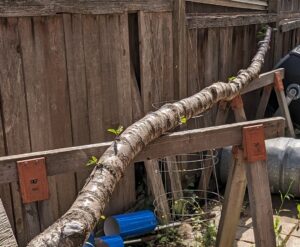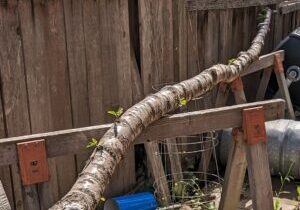New Shoots and Unending Hope
 The branch had been cut off the tree and set to the side of the yard to dry out and become firewood. It was a pretty long branch, probably one that had branched off from the trunk years ago. It sat in the sun and didn’t know it was supposed to be dead and drying out. Spring came as usual, and new shoots sprouted from the branch. They began to grow just as if they were still on the mother tree.
The branch had been cut off the tree and set to the side of the yard to dry out and become firewood. It was a pretty long branch, probably one that had branched off from the trunk years ago. It sat in the sun and didn’t know it was supposed to be dead and drying out. Spring came as usual, and new shoots sprouted from the branch. They began to grow just as if they were still on the mother tree.
I don’t know how long the new growth will be sustained, but many trees have grown from the trunks, stumps, or branches of other, older trees, which have fallen in the forest or been cut down and used for firewood or building useful things such as homes. I was reminded of the song from the St. Louis Jesuits, “Wood Hath Hope,” as I saw that branch, sitting up in the air with only non-living things supporting it, and new shoots sprouting hopefully in the sun and rain of a mid-June day.
Centuries ago, when the Jewish people were in exile in Babylon, Ezekiel spoke of a tender shoot torn from the top of a cedar. (Ezek 17:22-24) In this case, the reference to the shoot came after a series of reflections on the social and political destruction of the city of Jerusalem which led to the exile. The city was destroyed in 586 BCE. Yet as a member of the community of survivors in exile in the country responsible for the destruction of their own, Ezekiel could speak of hope and new birth.
The small bit of the mighty cedar from which the Lord God plucked it will now be planted on a tall, tall mountain in the highlands of Israel. As such shoots do, this one will grow and itself become a mighty tree in which birds can build their nests. Ezekiel tells us that all the trees of the field will learn from this that the Lord is working among them, building up the low trees and bringing down the high ones.
Like all prophecies, the story has a deeper meaning. The Lord cares for the lowly, protects and supports the lowly. In contrast, those who are strong and powerful, who don’t think they need the Lord’s protection and help, will fall.
For Ezekiel and those in exile with him, this prophecy gave hope that one day they would return home to Israel and Jerusalem might once again be restored. In time, that did indeed happen. Persia conquered Babylon and Cyrus, king of Persia, sent the Jewish people back to their land.
Jesus also spoke of small things becoming bigger. (Mk 4:26-34) He described a farmer who went out into a field and scattered his seeds. As the days passed, the seeds grew and eventually became ripe for harvest. Many grains grew from the seeds scattered on the field. The harvest was rich and more grain was available for sale or use by the farmer and also for planting the next year.
Another story described a tiny seed as comparable to the kingdom of God, a mustard seed. These tiny seeds were among the smallest we see, but they grew large enough to be like trees, sheltering and feeding birds and other small animals. I wrote about mustard seeds three years ago and invite you to read about them again today.
Jesus used stories to teach the people he met along the way each day. He took time to explain the stories to his closest friends, so they would know what he meant by them and not draw the wrong conclusion about the points he was trying to make. However, he knew that as humans, we remember stories better than long, drawn-out explanations. A story is nearly always a good place to start.
After we have spent a while pondering the stories and doing our best to live according to the lessons we have heard, we reach a point of trying to explain why we keep going and what it all means for us. St. Paul was no exception. He took time to explain to the community at Corinth what it had all come to mean for him and would ultimately mean for them. (2 Cor 5:6-10) He spoke of being at home in the body and at home with the Lord. We have two homes, he explained. The body is the reality of how we live here as humans, from infancy through the end of our lives. Being at home with the Lord is a way of saying we have ended our bodily life here with families, friends, and the realities of eating, drinking, working, playing, sleeping, and so forth. We now experience family, friends, and those who have come before us in a totally new and amazing way. We are with the Lord, the source of all life, true unending and limitless love.
To the extent we are really honest with ourselves and others, daily life is not always a garden of roses! There are hard things we have to experience and learn. There are wonderful times as well. With any luck at all, the wonderful times will be remembered clearly. However, all too often, we remember the hard times more quickly. We tend to forget that the everyday, ordinary things are far more common. Because they are so ordinary – is that why we forget them?
Paul reminds us that our lives here will come to an end. When that day comes, and we meet the Lord in person in our new home, we will remember much that has happened that we may prefer be forgotten. With the Lord’s help, may we also remember the many joys and blessings of the times we may have forgotten in which we really did meet the task set out for us from the beginning – to grow like a sprout on the branch of a tree, or a seed in a field, or a bird in a nest on a great mustard plant that grew from a tiny seed, easily overlooked as insignificant.
This is our challenge today. Where are we planted? What kind of plant are we meant to be? How will we grow and blossom to produce the fruit or grain needed by the One who tossed out the seed or plucked us from a different tree and planted us here? At best, we will simply move through our days, offering a smile, a gentle word, a greeting, a hand, a moment of silent companionship for those whose journey also continues alongside our own. And when the day comes that we go home to the Lord, may we all see the wonder of the tapestry of life that our times together have created.
Readings for the Eleventh Sunday in Ordinary Time – Cycle B










